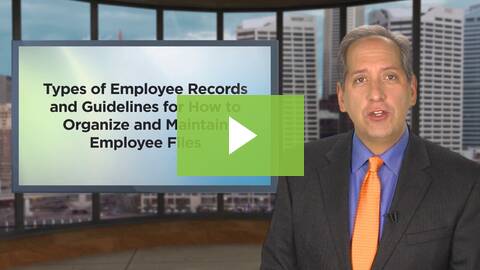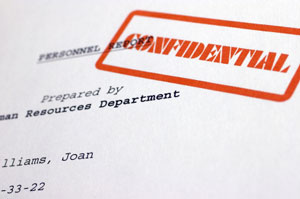
;
Employee Records and Files
Employers typically keep a number of different employee records, often called personnel files, as a way of documenting an employee’s relationship with a company. In certain instances, documentation in a personnel file can provide important supportive data—for example, to show an employee’s discipline history in support of a termination in subsequent litigation. The personnel file can also track performance goals, leaves of absence and any employment-related agreements.
In addition to being a good business practice, employers may be required to keep certain types of records in order to comply with specific provisions under both federal and state law. When collecting and maintaining information to be kept in employee personnel files, it is important to comply with all applicable federal and state laws, including any requirements as to what information must or should be collected, what your company may or may not do with that information, and how long employee records should be kept.
All employee records should be kept in a secure location, such as a locked cabinet or locked office.
Types of Employee Records
Personnel Files
A personnel file may contain documents that fall into one of the following categories of records:
- Basic Information. This category includes personal information such as the employee’s full name, social security number, address, and birth date. Employers may also wish to collect information relating to emergency contact numbers.
- Hiring Documents. Many employers retain documents related to the hiring process, including job descriptions, employment applications, and resumes.
- Job Performance and Development. This is a broad category that may encompass documents such as performance evaluations and supervisory or management notes regarding performance issues; corrective action or disciplinary letters; awards, nominations, and other commendation letters; promotion records; and records of training or education.
- Employment-Related Agreements. Any aspect of the employment relationship which is governed by an agreement between the parties, such as an employment agreement, union contracts, non-competition agreement, confidentiality or nondisclosure agreement, should be kept in the personnel file.
- Compensation. This category includes documents related to compensation and benefits information, such as W-4s and beneficiary forms, payroll records, and time cards for prior year(s).
- Termination and Post-Employment Information. It is a good idea to keep information related to an employee’s termination on file should a dispute later arise. Documents the employer may wish to retain include exit interview forms (if applicable) and any final employee performance appraisal, as well as a record of documents provided to the employee along with the final paycheck (e.g., termination letter, benefits notices, unemployment compensation forms).

Confidential Files--Keep Separate from the Personnel File
It is a good idea (and in certain instances may be legally required) to keep certain employee records and information in a confidential file separate from the personnel file, such as:
- Medical records and Workers' Compensation claims
- Federal and state leave documents
- Form I-9s
- Documents pertaining to an employee investigation such as a disciplinary action
- background checks--be sure a background check is permitted by your state
Please note that this list represents some of the key examples of personnel information which should be kept in a separate file. Please review the Records and File section thoroughly to get a good understanding of federal recording requirements. States may also have specific recordkeeping requirements as well. If you have any questions regarding the confidentiality of a particular record or form, please contact your state’s labor department or a knowledgeable employment law attorney.